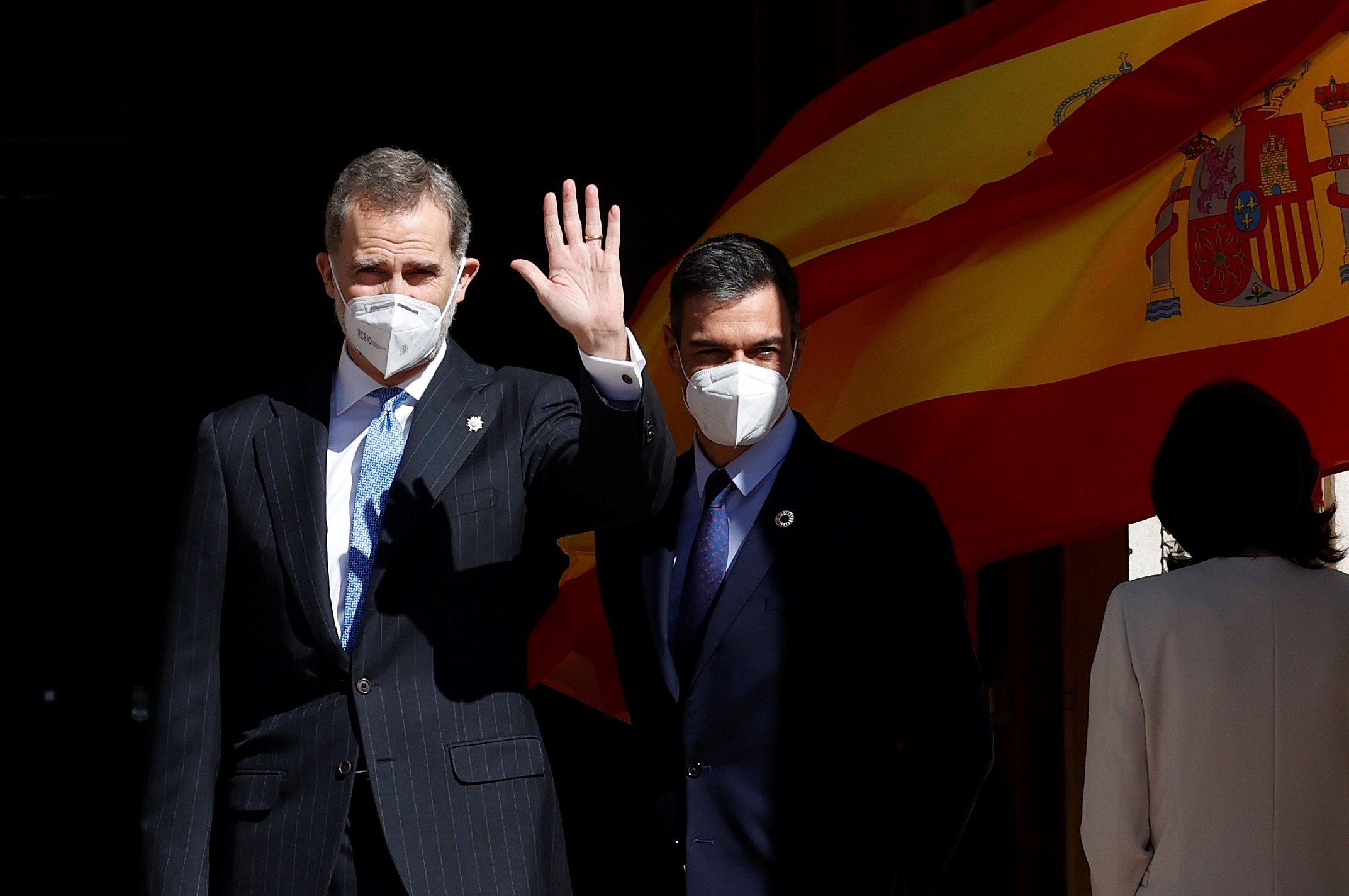Forty years have passed since the attempted military coup universally known in Spain as the 23-F. The great protagonist of that episode in 1981, the now-emeritus king Juan Carlos I, whom the official account places as the saviour of democracy, was today the great absentee. He has been a fugitive in the United Arab Emirates since last summer, as he is being prosecuted for corruption in Spain and Switzerland. In his place, the event presided over by parliamentary speaker Meritxell Batet in the Congress of Deputies was attended by his son, the current king, Felipe VI. The head of state referred to his father, whitewashing a royal role in the coup which for many years went unquestioned and now remains unexplained. "He assumed his responsibility and his commitment to the Constitution," defended the son. The current monarch was greeted on the street with applause and cheers from the people who waited outside on Calle San Jerónimo. The event, however, was boycotted by the pro-independence and pro-sovereignty parties from around the Spanish state, although not by Unidas Podemos, who are part of the Spanish government.
Felipe VI on the 40th anniversary of the 23-F: "Today, as king and symbol of the unity and permanence of the state, my commitment to the constitution is stronger than ever."
There were doubts about how he would approach the matter. In his speech in the Congress's Hall of Lost Steps, Felipe certainly mentioned Juan Carlos I, though without referring to him as his father. Specifically, the current head of state stressed that “in the face of that unacceptable fracture in the legitimate and legal democratic order, king Juan Carlos I assumed as head of state his responsibility and commitment to the constitution so that 'all the necessary measures were taken to maintain the constitutional order within the current legality'”. In this regard, he added that "this was communicated to all Spaniards in a televised message that is now part of our collective memory." And he concluded: "His firmness and authority were decisive for the defence and triumph of democracy."
That said, he passed to his own testimony on the moment, from the royal palace: “That night - still a child - I witnessed that historical episode and I learned the immense, the incalculable value that freedom has for the Spanish people”. He recalled how he experienced those moments with "anguish and worry" like millions of Spaniards and described it as "an attack of extraordinary gravity against the democratic system of rights and freedoms." He attributed the failure of the coup to "institutional and citizen rejection." He praised the figure of the then-president Adolfo Suárez, paradoxically a politician that Juan Carlos I also had in his sights.
But much of his speech focused on the monarchy's present, on his own figure, and not on that of its father, who was more likely to be challenged. "Today as king, symbol of the unity and permanence of the state, my commitment to the Constitution is stronger and firmer than ever," defended Felipe VI, reaffirming his "unequivocal will" for the crown to be "an institution that includes and integrates all Spaniards".
Iglesias challenges the narrative
Podemos leader and second-deputy PM Pablo Iglesias justified his presence on institutional grounds, but he challenged the narrative of Spain's Democratic Transition dollowing the death of Franco. In a media briefing before the event, Iglesias argued that, 40 years later, "it is very difficult to say that the monarchy is the condition that makes democracy possible." He reaffirmed that the “republican horizon” is making progress in Spain. And he put his finger on the sensitive spot: the absence of the disgraced Juan Carlos I. "It bears thinking about that in this country you can go to prison for a tweet or for writing a song while the former head of state is in the United Arab Emirates," he said. The Podemos leader did not applaud the king's speech.
Batet: 23-F is over
In the speech which opened the event, the speaker of the Spanish Congress made it clear that this happened 40 years ago and that there is no fear that it could be repeated today. Referring to the past, she celebrated the "determined reaction" of the different institutions, "led by his majesty king Juan Carlos", who "assumed the defence of democracy in the face of the threat of the coup". However, Meritxell Batet said that today there is a threat, only it is different: "the danager is in the de-legitimization and instrumentalization of the democratic institutions themselves to remove their fundamental contents."
Pro-independence boycott
There was a unitary response from the pro-independence parties across the whole Spanish state to the 40th anniversary of the attempted coup. The parliamentary groups of ERC, Junts, the PDeCAT, the CUP, EH Bildu and the BNG stood the king up in the event that the Congress of Deputies held for him. To explain their stand, they read a manifesto. The pro-independence and sovereignist forces not only challenged the official account of the Spanish Transition, but also the figure of king Juan Carlos I, who has been whitewashed today despite fleeing to the United Arab Emirates. In the same way, they registered an initiative demanding that the Spanish government declassify all the documents relating to the coup attempt forty years ago. Also absent from the event were Basque Nationalists (PNV), Más País and Compromís.

